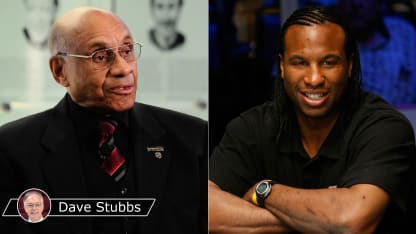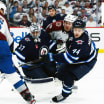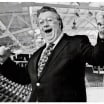It was almost four decades after O'Ree's debut when Laraque followed a man he would come to idolize into the NHL. Laraque played 695 rugged games for the Oilers, Phoenix Coyotes, Pittsburgh Penguins and Montreal Canadiens before retiring from the League in 2010.
Before he'd heard of O'Ree, Laraque devoured books and stories about the incredible odds and bitter racism that had been overcome by baseball pioneer Jackie Robinson, who graduated from the Montreal Royals of the International League to break his sport's color barrier with the Brooklyn Dodgers in 1947. And in time, he would similarly study O'Ree and the hurdles he had to clear in hockey and in life.
Both Robinson and O'Ree would make history in Montreal, where Laraque played the final 61 games of his NHL career.
"When I read about Jackie, I began to understand a little of what I'd have to go through, what to expect, if I was going to make it," he said. "That really helped me. Willie O'Ree was the same thing in hockey. Prejudices had to be broken. He showed that a black player could make it in the NHL."
It is O'Ree's qualities of inspiration that most impress Laraque, who today has a daily radio show on French-language radio in Montreal. He's dazzled by O'Ree's ability to communicate easily with young people and old-timers, all of whom marvel at his storytelling and positive messages.
"Willie and Jackie [Robinson], it was the same thing, the message they got in their time was they had to take it," Laraque said. "They had to pave the way. They knew that if they were emotional or if they reacted negatively in the face of racism and abuse, people would say, 'Look, they can't control themselves…'


















